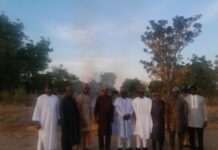Eleven international organizations have called for increased protection and support to civilians that are bearing the brunt of the conflict in the Lake Chad region.
The organisations include: Action Contre la Faim, CARE, International Emergency and Development Aid Relief, International Medical Corps and International Rescue Committee (IRC), Lutheran Word Foundation.
Others are Mercy Corps, Nigeria INGO Forum, Norwegian Refugee Council, Plan International and Save the Children.
A statement by the Team Leader, Media and Public Advocacy of the Norwegian Refugee Council, Tiril Skarstein said a two-day High-Level Conference on the Lake Chad region, including parts of Nigeria, Chad, Cameroon and Niger would hold on September 3rd and 4th 2018 in Berlin, Germany.
According to the statement, Ministers from the affected countries as well as Governors of the Lake Chad region, alongside donor countries, UN organizations, international and regional organizations, and civil society representatives will also attend.
“The nine-year long conflict in the Lake Chad Basin has dramatically affected the lives of about 11 million people who rely on humanitarian assistance to survive. The insurgency as well as military operations across the four countries have displaced 2.4 million people and left 5 million people food insecure, while significantly reducing economic activity.
“The conflict has taken a heavy toll on the local economies and people´s livelihoods, and has also led to a high number of civilian casualties and grave abuses, such as the recruitment of children by armed groups sexual violence and abductions. The security situation further impedes the humanitarian actors’ access to people in need of life-saving support. For instance, in northeast Nigeria, over 800,000 people still live in hard to reach areas with no access to humanitarian assistance, while military operations in the Lake Chad Islands currently prohibit organizations from providing assistance to the population.
“Last year’s conference helped avert a famine in the region. This year’s conference must not only continue this lifesaving operation, but must make protection of vulnerable children, women and men a top priority. Conflict-affected families depend on the international community to put the lives of civilians over and beyond competing political agendas, such as their war on terror,” said Secretary General for the Norwegian Refugee Council, Jan Egeland.
“The humanitarian community scaled up the response significantly in 2017, but humanitarian needs remain massive and will continue well into 2018 and beyond. Yet,eight months into the year, only 26 percent of the appeal for funding to Cameroon has been raised and the humanitarian appeal to support people affected by the crisis in Nigeria is less than half funded. The United Nations estimates that US$1.6 billion is required this year to help the 10.7 million in need of humanitarian assistance in the region.
“The crisis in north-east Nigeria is far from being resolved. Thousands of desperate people continue to arrive into congested areas on a weekly basis both from ‘inaccessible’ areas or across borders, some of them in a state of severe malnutrition. While development efforts to rebuild need to be stepped up, it is crucial that we maintain the necessary assistance to continue saving lives, particularly in remote field locations across Borno, Adamawa and Yobe states” said Jennifer Jalovec, Director of the Nigeria INGO Forum, which consists of 40 organisations working in Nigeria.
As the protection crisis in the Lake Chad region rages on for another year, children make up over half of those displaced. Women and girls face gender-based violence daily, are abducted, sexually exploited and abused, and struggling to survive early and forced marriage and intimate partner violence,” says Hannah Gibbin, Country Director for the International Rescue Committee in Cameroon. She emphasises the need for participants at the conference to face the facts head-on and join forces to provide lives of dignity and security.
Hussaini Abdu, Plan International’s Country Director in Nigeria, urges “all humanitarian actors, including donors, to urgently increase prioritisation, funding and coordination of efforts to prevent and respond to ongoing Gender-Based Violence and Child Protection needs and to fulfil adolescent girls’ sexual and reproductive health and rights (SRHR).”
The conference in Berlin next week will constitute another opportunity to shed light on a crisis that not only requires financial attention, but first and foremost, a political will from governmental actors at all levels to address the root causes of this conflict and ensure the lives and livelihoods of millions of women, men and children living in the Lake Chad Basin are protected.



